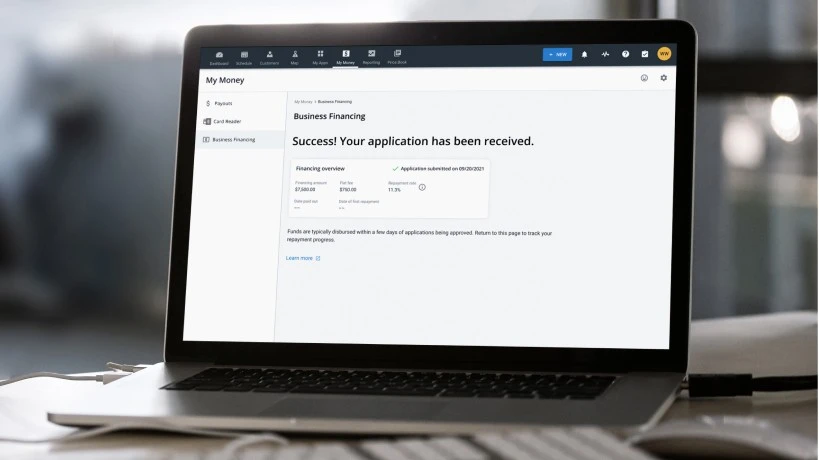
Did you know that nearly a half million people per month search for “Electricians near me”? And, that doesn’t even account for the thousands of others that are looking for an electrician but use a different phrase to find them. If you’re eager to attract a steady stream of new customers through search engines, you must have a strong SEO strategy in place to ensure that you’re being discovered. Why? Because 71% of searchers click on a result on the first page, with 68% clicking on one of the first five results.
If you want to learn the key to appearing prominently in search results and capturing the attention of potential customers for your electrical business, we’re here to teach you.
What is electrician SEO?
Electrician SEO (search engine optimization) is the process of optimizing an electrical website in order to rank higher on search engines like Google. This entails researching keywords, adding relevant content to your site, optimizing your pages to improve the experience for your visitors, informing search engines of important information, and capturing more links to your website. By implementing effective SEO tactics, electricians can improve their search engine rankings, attract more visitors to their site, and ultimately convert them into paying customers.
What SEO isn’t
To fully grasp the nitty-gritty of electrical SEO, it’s essential to understand what SEO isn’t:
SEO is NOT a replacement for poor web design:
While SEO can enhance the visibility of a website, it cannot compensate for poor web design. Search engines monitor and track the experience a visitor has after they click a listing, so a well-designed website is an important foundation upon which successful SEO strategies are built.
SEO is NOT just about rankings anymore:
While rankings are important, modern SEO goes beyond just securing a top spot in search results. It focuses on factors like traffic, conversions, and user engagement to drive tangible business outcomes.
SEO is NOT free:
Contrary to popular belief, proper SEO requires time, effort, and sometimes financial investment. It’s not a free service but rather a worthwhile investment in your business’s online success.
SEO is NOT a total solution but a piece of your overall marketing strategy:
It’s important to consider SEO as just one piece of the marketing puzzle. The most effective marketing strategy for electricians encompasses multiple channels, including paid search, social media, content marketing, and more.
SEO is NOT buying or cheating your way to the top:
Search engines are smart, so while using practices like buying links or stuffing keywords may yield short-term gains, they WILL result in long-term penalties from search engines. Genuine, white-hat SEO strategies are essential for sustainable success.
SEO is NOT finished – ever:
SEO is not a one-and-done task. It’s an ongoing process that requires continuous monitoring, tweaking, and adaptation to evolving algorithm updates and market conditions. Think of it as a journey, not a destination.
Where to start with electrician SEO?
Have you ever wondered how Google decides which websites deserve the top spots on its search results? It’s all about relevance, authority, and user experience.
Search engine algorithms are built to continually analyze countless factors, including keywords, website structure, the number and strength of backlinks, and user engagement, to determine a webpage’s ranking. Essentially, the goal of every search engine is to provide its users with the most relevant and high-quality results when they search for electrical services.
Local SEO for electricians
The significance of local SEO for electricians cannot be overstated. As mentioned at the beginning of this article, the phrase ‘Electrician near me” is searched nearly a half million times per month. And, that’s because someone located in upstate New York looking for an electrician doesn’t want to see a list of electricians located in southern California.
With the search intent of potential customers being highly localized, users often include location-specific keywords in their search queries when looking for electricians. This presents a golden opportunity for electricians to capture these leads by making sure their website is informing search engines of their service areas.
Keyword research for local SEO
The first step in any effective local SEO strategy is thorough keyword research. Electricians need to identify the most relevant and valuable keywords that potential customers are using to find electrical services in their area. By understanding the search intent behind these keywords, electricians can tailor their content to meet the needs of local customers.
For example, an electrician in Denver, Colorado, might target location-specific keywords such as “electrician in Denver” or “Denver electrical services.” Additionally, they could identify additional keywords related to specific services they offer, such as “residential electrical contractors in Denver” or “emergency electrician Denver.”
By identifying and incorporating these location-specific and additional keywords into their website content, meta tags, and headings, electricians can improve their search ranking when these searches are made and ultimately attract more local leads.
Optimizing your Google Business Profile
Your Google Business Profile (formerly Google My Business) is another powerful tool for electricians to enhance their search engine presence and attract more local customers. By setting up and/or improving your profile, you can ensure that your business appears prominently in Google search results and Google Maps, making it easier for potential customers to find and contact you.
While it might not seem obvious, Google Maps actually plays a crucial role in local search, especially for service-based businesses like electricians. By ensuring that your business is accurately represented on Google Maps, it becomes another place where you now appear, increasing your visibility to local customers who are actively searching for electrical services in your area.
Choose the correct business category
When setting up or updating your Google Business Profile, you want to be sure to choose the correct business category.
According to this WhiteSparks 2023 Local Ranking Factors research, your primary business category is a critical ranking factor.
For electricians, select a category like “Electrician,” “Electrical Installation Service,” or “Electrical Repair Shop” to accurately reflect the nature of your business. This helps Google understand the relevancy of the services you offer and improves your chances of appearing in relevant local search results.
Encourage reviews and upload high-quality photos
Positive reviews and high-quality photos can significantly impact your Google Business Profile’s visibility and credibility. Encourage satisfied customers to leave reviews on your profile, and don’t forget to respond to them promptly and professionally. Additionally, regularly uploading posts with high-quality images showcasing your work can further enhance your profile and attract potential customers.
Tools like GMB Everywhere can provide valuable insights into your competitors’ Google Business Profiles. By analyzing their categories, descriptions, and strategies, you can identify opportunities to improve your own profile and stay ahead in local search results. Keep an eye on your competitors’ categories and continue to update your profile to stay ahead of your competition in your market.
Local directories and citations
Listing your electrician services in local directories and obtaining citations from authoritative websites can significantly boost your local SEO rankings. Be sure to maintain consistency in your NAP (Name, Address, Phone Number) information across all directories to avoid confusing search engines and improve your local search visibility. Focus on building links to your website from authoritative websites within the electrical contracting industry (i.e. industry news sites, associations, etc.) to further strengthen your online presence and credibility.
Use BrightLocal or other local SEO tools to find the most authoritative directories for electricians.
Book more appointments with Housecall Pro’s Reserve With Google Integration
Picture this scenario: You’re an electrician, and someone in your community is facing an urgent electrical issue. They’re frantically searching on Google for a trusted professional who can help them out of their predicament. Thanks to your dedicated SEO efforts, your business appears prominently in their search results.
Now, instead of just displaying your contact details, Google presents them with a game-changing option: the ability to book an appointment with you then and there, directly through the search engine. It’s a game-changer.
This is where Housecall Pro’s Reserve with Google integration steps in. Through the Reserve with Google feature, you have the power to seamlessly capture these potential customers who land on your Google Business Profile. No more lost leads or missed opportunities – with just a few clicks, they can secure an appointment with you without ever navigating away from the search results.
Consider this: by simplifying the process for customers to schedule appointments online, you’re not just enhancing their experience; you’re also boosting your SEO efforts. Google values businesses that offer seamless solutions, keeping users engaged and satisfied. And what could be more seamless than integrating online booking directly into your Google presence?
Get In Touch: 858-842-5746
Let us earn your trust
See plan options and feature breakdown on our pricing page.
On-page SEO
On-page SEO, such as headlines, service areas, and descriptions to name a few, are a crucial part of any successful electrician search engine optimization strategy. You want to ensure the content on your pages and blog posts match your target audience’s search intent, include relevant internal and external links throughout that content, and is formatted in a way that makes the content engaging and simple for the user to read.
Website optimization
To conquer the search engine landscape, you need a well-optimized website that acts as a beacon for potential customers. Start by fine-tuning your title tags, meta descriptions, headings, and content with relevant keywords. Think about what your customers are searching for and incorporate those terms into your website’s structure.
But it’s not just about keywords – your website should be a breeze to navigate, with seamless navigation, mobile responsiveness, and clear calls to action like “Call Us” or “Get a Free Quote”.
Remember, user experience is monitored, so ensure your content is easy to digest, engaging, and informative.
Location-based keywords
Now, let’s talk location-based keywords – the secret sauce for attracting local customers. Incorporating electrician SEO keywords along with your city name can work wonders for your local visibility. When users search for “electrician [city name]”, you want your website to be right at the top of the list. By optimizing your website content, meta tags, and headings with location-specific keywords, you’ll vastly improve your chances of appearing at the top of local search results.
Location-based keywords checklist:
- Add city names naturally into your website content, meta tags, and headings.
- Use phrases like “residential electrician in [city name]” or “top electrical company [city name]” to target local customers.
- Ensure consistency across all pages to reinforce your local presence.
Service pages
Your service pages are the heart and soul of your website – they showcase your expertise and offerings to potential customers. But to truly shine in the eyes of search engines, they need to be optimized with relevant keywords and structured in a way that’s both user-friendly and search engine-friendly.
Include keywords naturally into your headings, body text, and image alt attributes, ensuring they flow seamlessly within the content. Avoid the temptation of keyword stuffing – instead focus on providing valuable information that addresses your audience’s needs and concerns.
Strategies for optimizing service pages:
- Address your customer pain points within your content.
- Ensure each service page targets a specific keyword or no more than 1-5 keywords.
- Use internal linking to connect service pages and create a cohesive website structure.
Title tags and meta descriptions
Title tags and meta descriptions are your website’s first impression on search engine users. Studies show that title tags and meta descriptions can improve your click-through rate (CTR) in the search results. Craft your title tags with keywords toward the front to catch the eye of both users and search engines. Aim for uniqueness – each page should have a title that sets it apart from the rest.
And, when it comes to meta descriptions, keep them snappy and engaging, under 160 characters, to entice users to click through from search results. With compelling titles and meta descriptions, you’ll increase the chances that your listings will be clicked on when they are seen..
Tips for title tags and meta descriptions:
- Plan your title tags to align with your content and include relevant keywords.
- Keep titles concise, ideally between 50-60 characters.
- Craft engaging meta descriptions that accurately represent the page’s content and entice users to click through.
Header tags
Header tags play a crucial role in organizing and structuring content on a webpage. They act as signposts of sorts, guiding readers through the main points and sections of the content. By breaking up text into digestible chunks, headings make it easier for users to navigate and find the information they need.
Well-structured headings not only improve the overall user experience on an electrician’s website but they are a search engine’s best friend. By dividing content into logical sections, they not only make it easier to read but also cater to users who prefer to skim through the text before delving deeper. And, they also explain to Google the importance of the different sections throughout the page.
Tips for effective header tag usage:
- Follow the hierarchy: Use one H1 for main titles, followed by H2 for major sections, and H3 for subsections.
- Maintain consistency: Ensure uniformity in formatting and styling across all header tags to maintain a professional appearance.
- Stay relevant: Each header should accurately represent the content it introduces, aiding users in understanding the context.
- Add keywords: Naturally, incorporate relevant keywords into header tags to enhance SEO without sacrificing readability.
Off-page SEO
Now that you’ve learned about on-page SEO, it’s time to dive into off-page SEO tactics, which are a game-changer when it comes to boosting your electrician website’s visibility. These strategies are focused on improving your site’s authority and credibility in the eyes of search engines, which is a major pillar for higher rankings and increased traffic.
Link building
Link building is the cornerstone of off-page SEO, and for good reason. By earning high-quality backlinks from reputable websites in the electrical industry, you signal to search engines that your site is a trustworthy source of information.
Consider guest blogging; where you write an article and give it to a site that covers industry news in electric, or for a major brand in the space. The article you contribute should give you an opportunity to include your company name and a link back to your site — either within the article, or as part of your author bio. Either way, you now have an inbound link from a website with more authority than your own.
This involves a bit of work in terms of email outreach and writing, but when done right, it’s a powerful strategy.
Social media marketing for electricians
You likely already have social media accounts, but you may not have known that those accounts play a pivotal role in off-page SEO for your website. Maintaining an active presence on platforms like Facebook, Instagram, and LinkedIn not only helps you connect with your audience but also enriches your presence in the eyes of search engines. Share valuable content, engage with your followers, and leverage social media advertising to amplify visibility.
Social platforms also act as a link-building approach, since they are seen by search engines as authoritative. When you have more than three social media profiles, you’re essentially increasing the links to your business.
Social media also facilitates content sharing among users, leading to even more backlinks and extended reach for your content. This sharing behavior indirectly impacts SEO by improving content performance and generating links from relevant websites across the internet.
Technical SEO
Thoughtfully implemented technical SEO is imperative for any organic search performance strategy as it helps make your website easy and fast to crawl for search engines during indexing.
Website speed optimization
Picture this: a potential customer lands on your website, eager to explore your electrical services. But wait, the page takes forever to load! Cue frustration and a swift exit. Don’t let sluggish load times sabotage your SEO efforts.
You can increase the speed of your website by reducing file sizes of images, minifying CSS and JavaScript files to streamline code, and leveraging browser caching to expedite page loading. A lightning-fast website not only enhances user experience but also sends positive signals to search engines, boosting your rankings in the process.
Mobile optimization
In today’s mobile-centric world, overlooking mobile optimization is a huge missed opportunity. With a significant portion of internet traffic originating from mobile devices, ensuring your electrician website is optimized for smartphones and tablets is paramount.
Embrace responsive design principles, which means ensuring your site looks good and performs well on different screen sizes. Create mobile-friendly content that’s easy to read and navigate on smaller screens. Additionally, prioritize improving page load times for mobile users by reducing image file sizes and unnecessary elements. Doing this will not only enhance the experience for potential customers but also bolster your SEO efforts, as search engines prioritize mobile-friendly websites in their rankings.
URL structure and navigation
The URL of your electrician website is more than just a www address – it’s another important component of your SEO strategy as well. Your URL plays a big role in communicating the relevancy of your site and pages to search engines as it relates to searches. Below are some best practices for optimizing your URL structure to maximize its SEO potential.
- Logical hierarchy: Create a logical hierarchy that aligns with your site’s content, organizing pages into meaningful categories and subcategories. This makes it easier for users to navigate your site and for search engines to understand the relationship between different pages. For example, you might have a category called “Services” and your services are broken into subcategories called “Commercial” and “Residential”.
- Descriptive URLs: Use short, descriptive URLs that include relevant keywords related to the content of the page. Avoid using unnecessary stop words like “the,” “and,” or “for,” which can clutter your URLs and make them less readable. I.e /electrical-repair instead of /electrical-repair-for-indoor-and-outdoor
- Readability and user-friendliness: Make sure that your URLs are easy to read and follow, both for humans and search engine crawlers. Use hyphens to separate words and avoid using special characters or symbols that can cause confusion.
- Avoid complex structures: Keep your URL structure simple, avoiding complex structures that make it difficult for users and search engines to navigate your site such as several subcategories.
Example URL structure for electrician websites
A well-structured URL helps search engines like Google index your web pages effectively, aiding in page discovery and determining the importance of each page. By following the best practices mentioned above, you can be certain that your website is easy to navigate for your visitors and search engine crawlers. To give you a better understanding, let’s look at an example URL structure that electricians can use to organize their website URLs most effectively:
- Homepage: www.myelectricalcontractor.com
- Service pages (Categories and Subcategories):
- Residential Electrical Services: www.myelectricalcontractor.com/services/residential
- Commercial Electrical Services: www.myelectricalcontractor.com/services/commercial
- Industrial Electrical Services: www.myelectricalcontractor.com/services/industrial
- Service sub-pages:
- Electrical Wiring: www.myelectricalcontractor.com/services/residential/electrical-wiring
- Lighting Installation: www.myelectricalcontractor.com/services/commercial/lighting-installation
- Panel Upgrades: www.myelectricalcontractor.com/services/industrial/panel-upgrades
- About Us page: www.myelectricalcontractor.com/about-us
- Contact page: www.myelectricalcontractor.com/contact
- Blog: www.myelectricalcontractor.com/blog
- Individual blog posts: www.myelectricalcontractor.com/blog/post-title-1
This URL structure hierarchy is organized logically, making it easy for users to quickly find what they need and for search engines to crawl and index your pages effectively. Each URL is descriptive and includes relevant keywords, which is also helping to improve your SEO performance.
SEO tools for electricians
Google Search Console
Google Search Console acts as your digital dashboard for your organic search traffic, offering insights into your website’s performance in Google search results including clicks, impressions, CTR (click-through-rate), and average keyword position. This free tool identifies technical issues that may be hindering your visibility, providing actionable steps to improve rankings for electrician-related queries.
Google Keyword Planner
Google’s Keyword Planner is a tool for shaping your SEO strategy based on search behaviors of your potential customers. This free tool provides keyword ideas, search volume data, and competitive analysis, helping you better understand what keywords have the greatest potential for your website.
BrightLocal
For local SEO, BrightLocal is a standout tool for electricians aiming to enhance visibility in their service areas. While it’s not a free tool, BrightLocal simplifies local SEO efforts by aiding with your directory listings, monitoring your local SEO rankings, and gathering customer reviews. It’s a tool that’s well worth the investment.
Google Analytics
No SEO toolkit is complete without Google Analytics, which is essential for monitoring your website traffic from every channel and overall site performance. Like the other tools Google offers, this is also free and offers insights into traffic sources, user behavior, site conversions and much more.
Conclusion
So there you have it! We’ve covered a wide range of actionable SEO strategies tailored specifically for electricians, from on-page optimization to off-page tactics. You now have the knowledge and tools to improve your search engine ranking, attract more customers, and ultimately grow your electrical business.
Remember, SEO is not a one-and-done marketing tactic, but an ongoing strategy to stay ahead in the competitive electrical industry. So, don’t wait any longer – start optimizing your website today and watch your electrician business steadily capture your local market!






